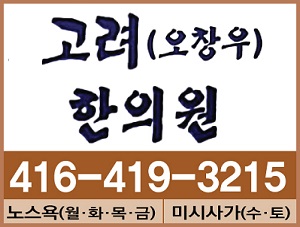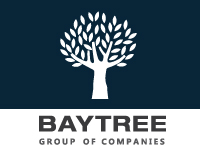CA
ON
캐나다 공인 컨설턴트 - 한인크레딧 컨설팅
전화: 416-897-8438
1 High Meadow Place, Unit 2 North York, ON

변호사 정찬수 법률사무소
전화: +82 2-536-1144
서울특별시 서초구 서초동 Toronto, ON
1.jfif)
최고의 POS시스템 - 스마트 디지탈 POS
전화: 416-909-7070
4065 CHESSWOOD DR. NORTH YORK Toronto, ON
0.jfif)
행복부동산 -수잔정 Home Standards Brickstone Real
전화: 647-866-7878
180 Steeles Ave W Unit 30, Thornhill, ON

놀부 - 한식/일식/중식
전화: 416-221-4700
3 Elmhurst Ave, North York, ON

고려 오창우 한의원
전화: 416-226-2624
77 Finch Ave W #302, North York Toronto, ON

토론토 기쁨이 충만한 교회
전화: 416-663-9191
1100 Petrolia Rd Toronto, ON

준비된 바이어 그룹 , BAYTREE 이너써클
전화: 416-226-5999
7030 Woodbine Ave. Suite 103 Toronto, ON

K-포차 ...미시사가(만두향프라자)
전화: 905-824-2141
169 DUNDAS ST. E. #7 Mississauga, ON

대형스크린,LED싸인 & 간판 - 대신전광판
전화: 416-909-7070
4065 Chesswood Drive Toronto, ON

조준상 (로열르페이지 한인부동산 대표)
전화: 416-449-7600
1993 Leslie St. Toronto, ON

럭키조경 & 나무자르기
전화: 647-564-8383
4699 Keele St. Unit 218 Toronto, ON

It would be a place where all the visitors including me share the life stories and experiences through their activities,especially on life as a immigrant.
Why don't you visit my personal blog:
www.lifemeansgo.blogspot.com
Many thanks.
블로그 ( 오늘 방문자 수: 125 전체: 267,544 )
2차 남,북,정상회담 개최
lakepurity
2007-10-01
North, South Korean leaders to hold summit
BURT HERMAN
Associated Press
October 1, 2007 at 1:52 PM EDT
Seoul — South Korea's president is headed for a summit with the North's Kim Jong Il, saying he will seek peace on the peninsula in the second such meeting between the divided nation's leaders.
The three-day meeting in Pyongyang, starting Tuesday, will mark the first extended appearance of the enigmatic, authoritarian Mr. Kim before the world since the two Koreas' only other summit in June 2000. South Korean President Roh Moo-hyun is scheduled to deliver a speech Tuesday before departing by road for Pyongyang — stepping out of his armoured car for a stroll into the heavily armed Demilitarized Zone, the front line marking the 54-year-old cease-fire between the North and South that halted the Korean War.
The meeting comes at a time of talks over disarmament, with North Korean negotiators set to respond Tuesday to the latest road map. Almost exactly a year ago, the North tested a nuclear bomb, rattling regional stability and leading to a dramatic turnaround in the previously hard-line U.S. policy. Since then, Pyongyang has shut down its sole operating nuclear reactor — which produced material for bombs — and has tentatively agreed to disable its atomic facilities by year-end in a way that they cannot easily be re-launched.
Accompanied by industry leaders, politicians and cultural figures, Mr. Roh will spend hours in dialogue with Mr. Kim, tour the country and watch the spectacle of thousands of synchronized performers glorifying the North's communist regime. On Monday, amid the echoes of artillery during a ceremony commemorating the South's Armed Forces Day, Mr. Roh stressed that peace can only come from a position of strength.
“It would be difficult for any strategy toward peace to succeed unless it is backed by strong military power,” Mr. Roh said at the South's military headquarters near Daejeon, 160 kilometres south of Seoul.
He said the rival Koreas would eventually discuss how to build military confidence, reduce arms and replace the 1953 Korean War cease-fire with a peace treaty.
Unification Minister Lee Jae-joung told reporters in Seoul that the two Koreas would discuss peace in broad terms, but acknowledged they could not tackle the issue alone. Any real peace treaty would require the participation of the United States and China, which signed the original armistice. North Korea also signed, while the South did not.
State Department spokesman Tom Casey said Monday that the United States generally supports such North-South contacts, and that nuclear matters would likely be discussed. He added, “I don't think that there's anything particular about their conversations, though, that will change substantively the discussions that just occurred in Beijing.” He declined to comment further.
The meeting has political undertones for Mr. Roh, who leaves office in February. The conservative South Korean opposition has criticized the summit as a ploy aimed at bolstering his sagging popularity, along with that of liberals aligned with him, just two months before the next presidential election.
The North's Kim is also angling to keep the conservatives from power in Seoul, fearful they will reverse the policy of engagement that has brought his impoverished country aid and income despite its continued development of nuclear weapons.
But Mr. Roh insists there is never a bad time to improve relations between the Koreas. He is travelling to Mr. Kim's stronghold of Pyongyang, even though the North Korean leader had promised in 2000 to come to the South for a return summit.
The first summit won former South Korean President Kim Dae-jung the Nobel Peace Prize for his “sunshine policy,” but the achievement was tainted by revelations of some $500 million in secret payments to Pyongyang.
Since then, the two Koreas have reconnected rail and road links across their border and established a joint industrial zone in a North Korean border city. Thousands of Korean families divided between North and South have also met in brief and emotional reunions.